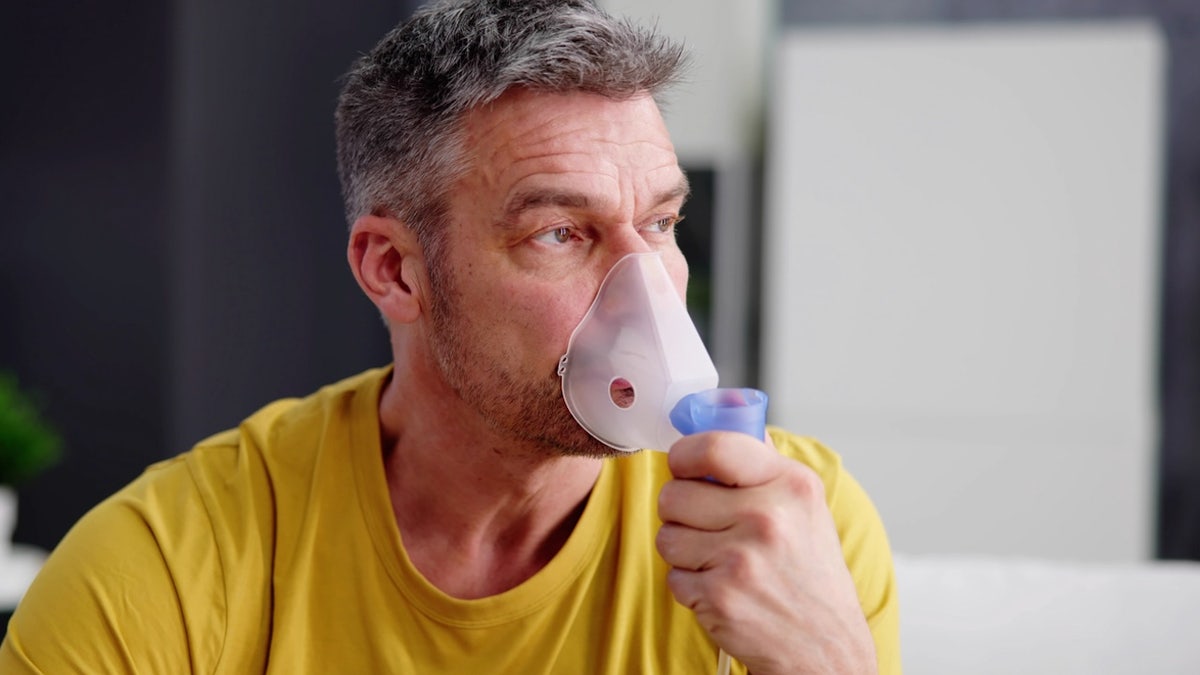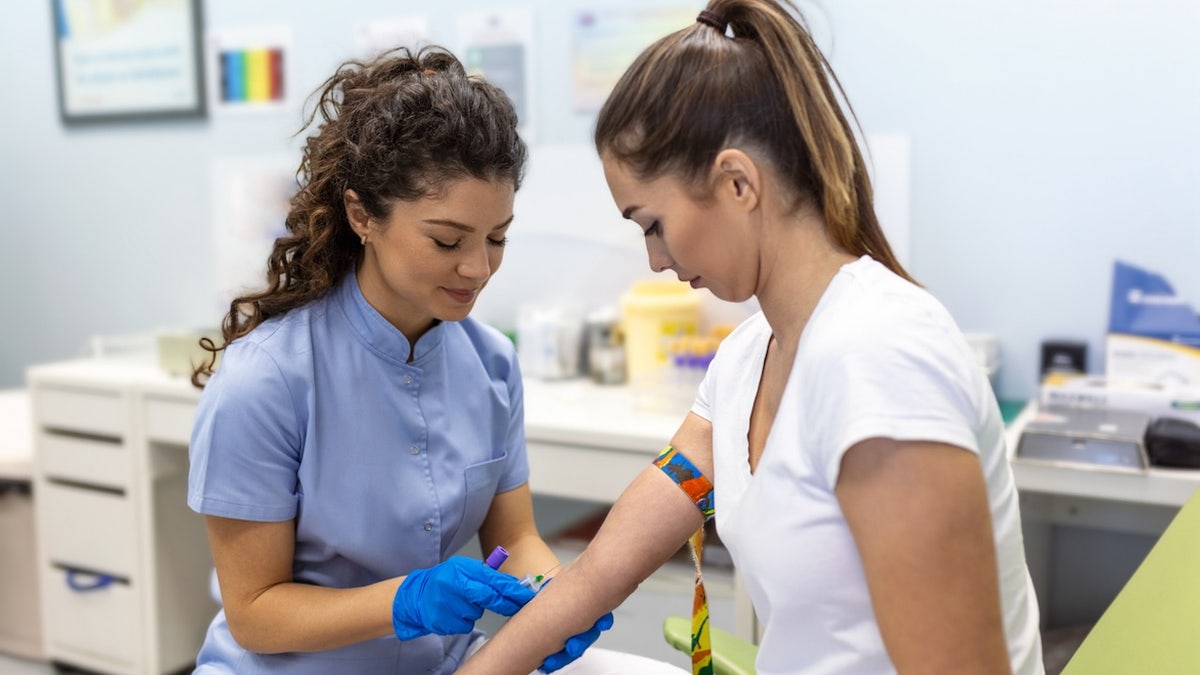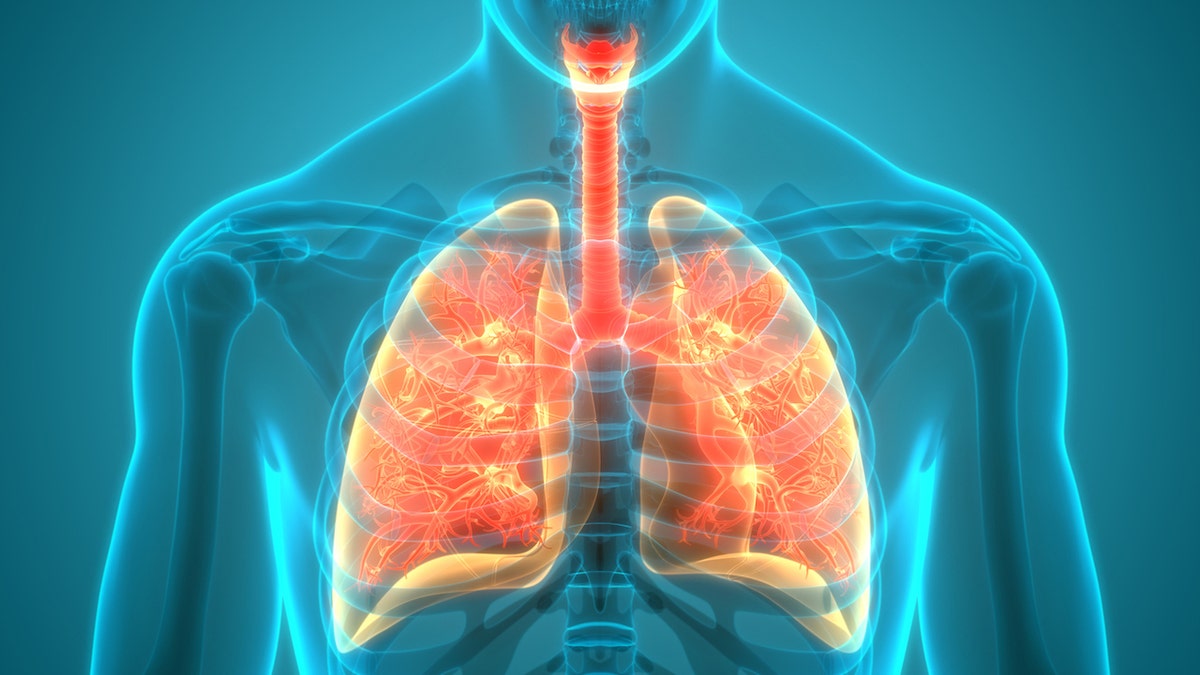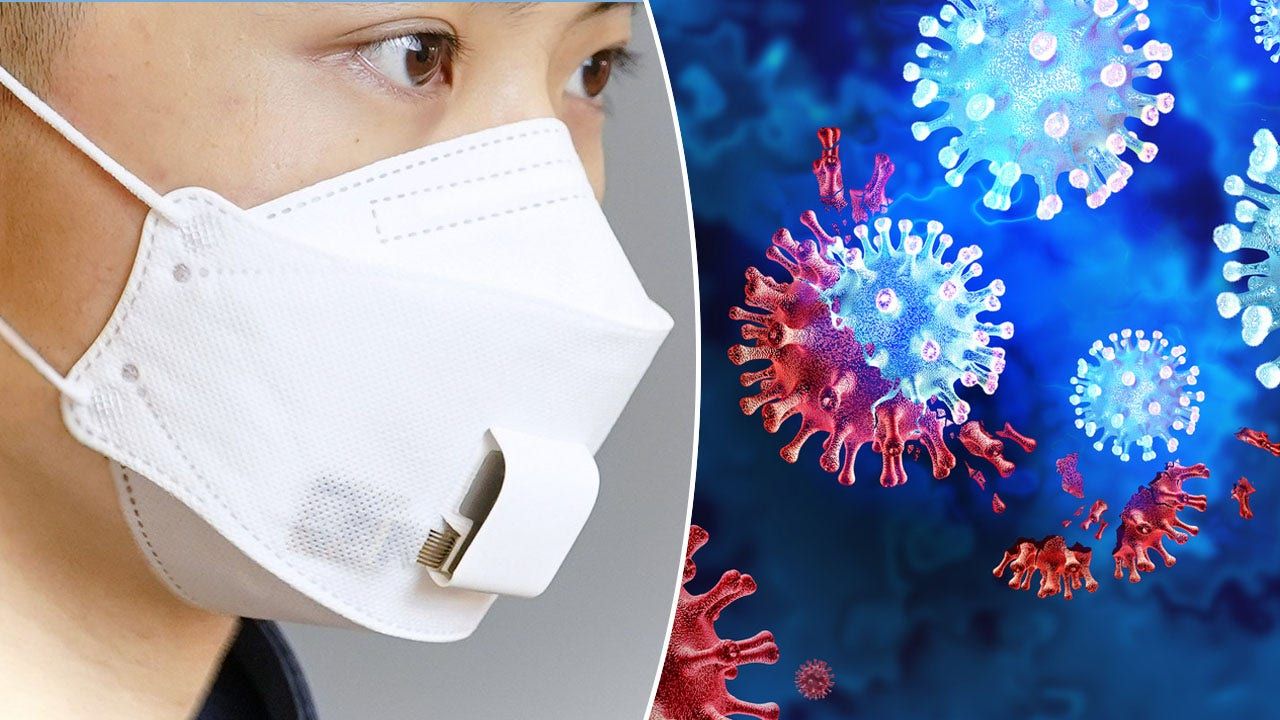Your breath could hold clues about your health, researchers say, and they've developed a “smart mask” to harness them.
Wei Gao, a professor of medical engineering at the California Institute of Technology (Caltech) in Pasadena, led the team that created EBCare, a mask that analyzes chemicals in a person's breath to detect any existing health problems.
The mask is designed to detect medical conditions such as respiratory infections, COPD (chronic obstructive pulmonary disease), asthma and post-COVID infections, according to a Caltech press release.
RESEARCHERS SAY YOUR SWEAT MIGHT HOLD SECRETS ABOUT YOUR HEALTH — HERE'S HOW
EBCare works by cooling your breath into a liquid and then transporting it to sensors to analyze it for specific biomarkers.
Researchers have developed a “smart mask” (pictured left) to detect signs of disease. (Caltech/Wei Gao and Wenzheng Heng; iStock)
In an email to Fox News Digital, lead researcher Gao highlighted the mask's ability to enable “continuous, real-time monitoring of exhaled breath condensate (EBC) in a noninvasive, portable format.”
“This technology has the potential to revolutionize the way we monitor respiratory health by providing valuable insights into conditions such as asthma, COPD and other metabolic disorders,” Gao said, noting that it could be a path toward more personalized healthcare.
BLOOD PRESSURE IS 'HIGHER THAN NORMAL' IN 1 IN 7 CHILDREN, AMERICAN HEART ASSOCIATION SAYS
“It can also be applied to pandemic management by monitoring respiratory infections on a large scale,” he added.
The ultimate goal is for EBCare technology to go beyond respiratory diseases, Gao said.
“As research progresses, we envision that the smart mask can be adapted to detect a broader range of biomarkers, including those related to metabolic, cardiovascular and infectious diseases,” he said.

This schematic shows the process by which the smart mask can detect chemicals in the breath, such as nitrite, which is an indicator of airway inflammation. (Caltech/Wei Gao and Wenzheng Heng)
According to Caltech, a study of the mask's capabilities involved 31 healthy adults wearing the EBCare in real-life situations for a period of 14 hours. They only took it off for three-minute intervals to eat.
Ten of the participants were smokers, 10 had asthma, nine had COPD, and 12 had recently recovered from COVID-19.
STUDY FINDS THAT HEART DISEASE RISK IN WOMEN COULD BE PREDICTED UP TO 30 YEARS IN ADVANCE WITH A BLOOD TEST
The masks accurately detected asthma and COPD biomarkers in participating patients. They also successfully detected signs of kidney disease.
EBCare also produced accurate readings of blood alcohol levels.
“Real-time alcohol monitoring offers a noninvasive, continuous alternative to breathalyzers or blood tests,” Gao said.
“We would need to see at least some clinical studies showing that masks can diagnose better, or more quickly, or with greater sensitivity, than the standard of care.”
The research, which was funded by the National Institutes of Health, the National Science Foundation, the Tobacco-Related Diseases Research Program and the U.S. Army Medical Research Acquisition Activity, was published in the journal Science on August 29.
The idea is not for the smart mask to replace traditional medical diagnosis, but to provide “early warning” through continuous health monitoring during daily activities and “bridge the gap” between doctor visits, Gao said.
FDA APPROVES NEW BLOOD TEST FOR SCREENING COLON CANCER: “EARLY DETECTION IS KEY”
“The goal is to identify subtle physiological changes before they develop into more serious conditions, giving people the opportunity to take proactive steps in managing their health,” he said.
This is especially important for those who need regular monitoring, such as patients with chronic diseases or those recovering from respiratory infections like COVID-19, according to Gao.

The mask (not pictured) is designed to detect medical conditions such as respiratory infections, COPD (chronic obstructive pulmonary disease), asthma, and post-COVID infections. (iStock)
“I recommend that healthcare providers consider integrating real-time EBC analysis technology into their diagnostic and monitoring practices, especially for chronic diseases such as asthma and COPD,” he said.
“For individuals, the ability to monitor their health noninvasively through a wearable device offers the opportunity to be more proactive in managing personal health, which can lead to early intervention and better health outcomes.”
FIRST HOME SYPHILIS ANTIBODY TEST GETS FDA OK AS STD CASES RISE IN U.S.
MarkAlain Déry, DO, MPH, infectious disease physician and chief innovation officer at Access to health care in Louisianawho was not involved in the development of the smart mask, agreed that it is an “exciting concept.”
“Could it work? Sure,” he told Fox News Digital.

Wei Gao, a professor of medical engineering at the California Institute of Technology in Pasadena, led the team that created the EBCare mask. (Caltech)
“However, we would need to see at least some clinical studies showing that masks can diagnose better, or more quickly, or with more sensitivity, than the standard of care,” he continued.
“Then we would need studies that demonstrate clinical improvement.”
Potential Limitations
Some outside physicians who were not involved in the development of the mask questioned whether this mode of data collection is beneficial.
AI speeds up dementia diagnosis by harnessing 'hidden information' in brain waves
“While the mask introduces an innovative method for monitoring exhaled breath condensate (EBC), we must ask an important question: Do these continuous, real-time measurements really make a difference in everyday life?” said Dr. Brett Osborn, a neurosurgeon in Florida, in a conversation with Fox News Digital.
“For the average person, the biomarkers it detects (ammonium, pH, nitrite and alcohol) do not need constant monitoring, especially when routine blood tests can provide this information with greater accuracy and relevance.”

“For the average person, the biomarkers it detects… do not need constant monitoring, especially when routine blood tests can provide this information with greater accuracy and relevance,” one doctor said. (iStock)
Osborn believes the EBCare mask concept is best suited for “specific high-risk environments,” such as real-time monitoring of toxic gases in military or industrial settings.
“However, for the average person, especially in a post-pandemic world, the idea of wearing a mask like this is counterproductive,” he said.
CLICK HERE TO GET THE FOX NEWS APP
Dr. John W. Ayers, PhD, vice chair for innovation in the Division of Infectious Diseases and Global Public Health at the University of California, San Diego, also questioned the idea that patients with asthma or COPD, who already experience breathing difficulties, should wear the masks.
“For the average person, especially in a post-pandemic world, the idea of wearing a mask like this is counterproductive.”
Lead researcher Gao responded to some of these comments.
“While routine blood tests are certainly reliable, they are typically periodic and require a clinical setting, which limits their ability to capture dynamic, day-to-day physiological changes,” he told Fox News Digital.
CLICK HERE TO SUBSCRIBE TO OUR HEALTH NEWSLETTER
“The real innovation of the EBCare mask lies in its ability to continuously monitor health in real time, providing insights that might not be detectable with intermittent testing.”

For people with chronic diseases such as asthma, COPD or metabolic disorders, fluctuations in certain biomarkers can provide early warning signals, researchers say. (iStock)
For people with chronic diseases such as asthma, COPD or metabolic disorders, fluctuations in certain biomarkers can provide early warning signals before symptoms worsen, allowing for timely intervention, according to the researcher.
However, Gao acknowledged some limitations of the EBCare device.
For more articles on health, visit www.foxnews.com/health
“One limitation was the relatively small sample size in some of the clinical trials, particularly for diseases like COPD and asthma,” he told Fox News Digital.
“Future studies with larger, more diverse populations will help further validate the device's performance under a wider range of conditions and environments.”












